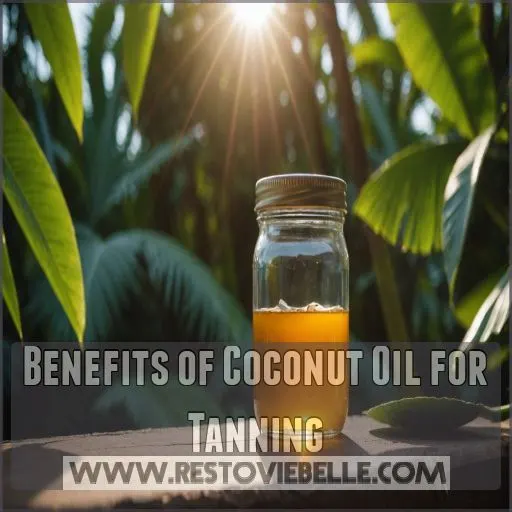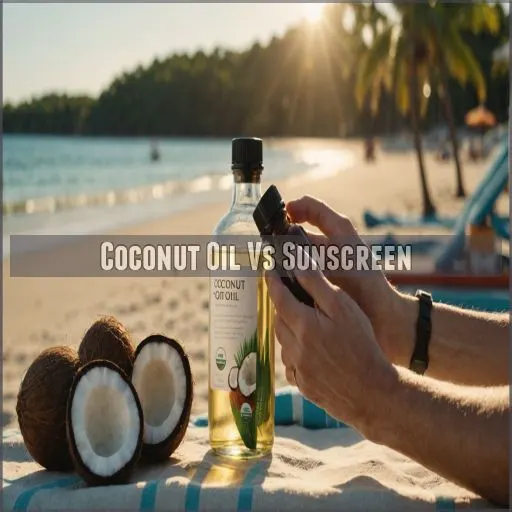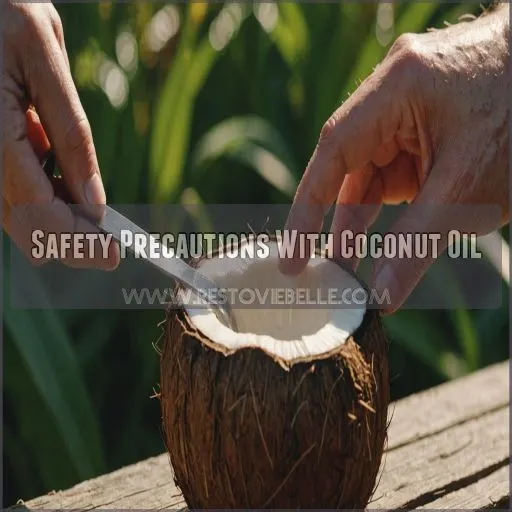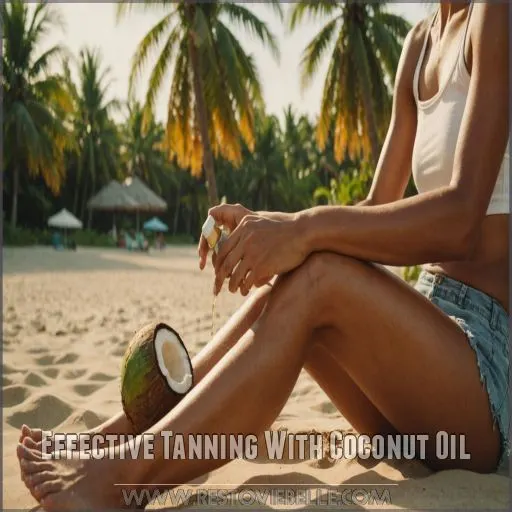This site is supported by our readers. We may earn a commission, at no cost to you, if you purchase through links.

While this tropical treasure can give your skin a lovely glow and hydrate like a desert oasis, it won’t guard you against the sun’s fiery wrath.
Coconut oil contains ingredients that slightly enhance melanin production, giving you that sun-kissed look, but its SPF is low—imagine bringing a paper umbrella to a rainstorm!
Use it for hydration and a healthy skin boost, but always pair with a high SPF sunscreen to avoid turning into a lobster.
Want to maintain that perfect tan and know more safe sun soaking tips like using sunscreen?? Stick around for the juicy details!
Table Of Contents
Key Takeaways
- coconut oil can boost melanin production for a bronzed look, like a natural glow enhancer, but it doesn’t protect you from sunburn. Pair it with high-SPF sunscreen—think of it as sunscreen’s trusty sidekick in your tanning quest.
- Slathering on coconut oil before tanning helps hydrate your skin, just like a drink of water in a desert, keeping it supple and reducing peeling afterward.
- While coconut oil feels rich and nourishing, it’s got the SPF of a paper umbrella in a rainstorm. Always use sunscreen with it to avoid looking like a lobster at a beach BBQ.
- Smart sun soaking involves safety; mix coconut oil with other skincare goodies, keep shade handy, and remember that peak sun hours mean high UV risks. Tan smart and keep your skin happy!
Benefits of Coconut Oil for Tanning
Coconut oil can be a powerful ally in your tanning journey, offering a range of skin-nourishing benefits. From boosting melanin production to protecting against environmental stressors, this versatile oil can help you achieve a healthy, glowing tan.
Hydrating Properties for Skin
If you’ve ever felt your skin’s thirst for moisture, coconut oil might just be your oasis.
It excels at skin moisture retention, making dry skin a thing of the past.
Unlike a run-of-the-mill lotion, it doesn’t clog pores.
Add it to your daily hydration routine, and let your skin drink in every drop of nourishing goodness.
Cheers to glowing skin!
Lauric Acid and Fatty Acids for Skin Health
Coconut oil is your skin’s best friend, thanks to its lauric acid and fatty acids, which boost skin barrier function and offer anti-inflammatory properties.
Unlike some other oils, this secret weapon helps calm irritation while keeping your skin smooth as silk.
But remember, coconut oil vs. other oils? It’s like comparing apples and oranges—each has unique benefits!
Enhanced Melanin Production for Tanning
You’ve probably wondered if coconut oil can give you a golden glow.
As melanin production ramps up, oil helps naturally tan. That said, it’s not a magic potion.
- Boosts melanin with sun exposure
- Enhances your skin tone
- Coconut oil offers minor protection against sun damage when applied to hair
- Can be fun, but silly in excessive amounts, like wearing sunglasses at night!
Nourishing Skin for a Healthier Tan
When you nourish your skin with coconut oil before tanning, you’ll enjoy a healthier, longer-lasting glow.
The fatty acids and lauric acid in coconut oil deeply hydrate your skin, allowing it to better withstand UV exposure and maintain its natural moisture barrier.
This helps prevent dryness, peeling, and premature fading of your tan.
| Skin Benefits | Hydration | Nourishment | Tan Longevity |
|---|---|---|---|
| Coconut Oil | Deeply hydrates | Provides essential fatty acids | Helps maintain healthy, glowing tan |
Protecting Skin From Environmental Stressors
While nourishing your skin for a healthy glow, it’s like giving it a superhero cape against pollution, like how using a hydrating self tanner can help protect skin from harmful sun exposure.
The antioxidant benefits of coconut oil can help shield your skin from environmental foes.
Incorporate it into your skincare routine to combat pollution effects.
Combine with a healthy diet and smart practices for sun damage prevention, letting your skin thrive naturally.
Coconut Oil Vs Sunscreen
When tanning, slathering coconut oil on your skin may feel tropical, but it won’t protect you from harmful UV rays like sunscreen.
If you don’t want to resemble a lobster by the day’s end, combining coconut oil with a high SPF sunscreen could be a safer bet.
Low SPF Rating in Coconut Oil
Coconut oil boasts hydrating benefits, but don’t mistake it for sunscreen for hair care. Its SPF rating barely scratches the surface, much like using an umbrella with holes in a rainstorm. You wouldn’t rely on a colander to hold water, right?
To tan safely, pair coconut oil’s charm with a high-SPF sunscreen to dodge the pitfalls of sunburn risk.
Risks of Sunburn and Skin Damage
Although coconut oil has some benefits, it lacks sufficient sun protection.
Exposing your skin to UV rays without proper SPF can lead to painful sunburns, premature aging, and even skin cancer.
Don’t let the tropical allure fool you – your skin needs robust, broad-spectrum defense against the sun’s damaging effects.
Stay safe and prioritize sun-smart habits.
Combining Coconut Oil With Higher SPF Sunscreen
Mixing coconut oil with a sunscreen of higher SPF can be your winning strategy for a sun-kissed look minus the burn.
You’re not compromising sun safety for a fleeting tan.
Think of SPF as your bodyguard—coconut oil, though charming, won’t prevent sun damage alone.
Blending both, you get the silky benefits with added security.
Tan smarter, not harder!
Importance of Sun-Safe Practices
A sun-kissed glow is tempting, but your skin’s health takes center stage.
Embrace sun-safe practices to prevent burns and cancer risks:
- Seek shade during peak sun hours.
- Wear a broad-brimmed hat—a stylish shield.
- Use broad-spectrum sunscreen for ultimate defense.
- Reapply every two hours, even if “just a splash” sounds sufficient.
Catch the rays, not the damage!
Replacing Coconut Oil With Higher SPF Alternatives
You’ve embraced sun-safe practices, now ponder replacing coconut oil with higher SPF alternatives. Why? It’s as reliable as sunscreen myths! Let science guide you:
| SPF Alternatives | Benefits | Drawbacks |
|---|---|---|
| Sunscreen SPF 50 | High protection | Chemical concern |
| Zinc Oxide | Natural, gentle | May leave residue |
| Titanium Dioxide | Broad spectrum | Often opaque |
| SPF Clothing | Full coverage | Limited design |
| Shade Trees | Natural barrier | Location-bound |
Choose wisely for sun-kissed freedom!
How to Use Coconut Oil for Tanning
Want to achieve a sun-kissed glow with coconut oil? You’re in luck!
From pre-tanning hydration to post-tanning moisturizing, we’ll guide you through the dos and don’ts of using this versatile oil for safe, healthy tanning.
Pre-Tanning Application for Hydration
Dreaming of a sun-kissed glow? Start with coconut oil for your perfect skin prep. It hydrates like a tall glass of water in a desert.
- Apply it evenly 30 minutes before tanning.
- Massage in circular motions for even coverage.
- Let it absorb—perfection takes a little patience!
Feel that silky smoothness? You’re ready!
Post-Tanning Application for Moisturizing
Wow, what a day in the sun! When your tanning session’s over, coconut oil becomes your skin’s best friend. It’s like giving your skin a high-five!
Post-tan, rub a bit of this moisturizing magic on to soothe and nourish.
Check out this table of popular coconut oil brands for post-tanning pampering:
| Brand | Features | Cost |
|---|---|---|
| Nutiva | Organic, Cold-Pressed | $$ |
| Viva Naturals | Extra Virgin | $$ |
| Dr. Bronner’s | Fair Trade | $$ |
These oils help lock in moisture, turning your golden glow into a long-lasting treasure!
Combining Coconut Oil With Other Skincare Products
Sometimes, mixing coconut oil with other skincare products boosts your tanning game.
For example, blending it with retinol and vitamin C enhances your glow.
Using it alongside hyaluronic acid keeps skin hydrated.
Pairing coconut oil with exfoliating scrubs or face masks can reveal even smoother skin.
However, make sure all ingredients peacefully coexist to avoid skin drama!
Using Coconut Oil as a Tanning Oil Substitute
Coconut oil can be a great natural alternative to traditional tanning oils, like the natural ingredients found in hair care products.
Simply apply a thin layer before sun exposure to help hydrate and nourish your skin.
Just remember, coconut oil has a low SPF, so it’s really important to pair it with a higher SPF sunscreen to prevent sunburns and skin damage.
Moderation is key for safe, healthy tanning.
Tips for Applying Coconut Oil for Optimal Results
Switching to coconut oil as a tanning oil substitute? Consider these tips for best results.
- Timing is Everything: Apply before tanning and reapply post-sun for hydration.
- Consistency Counts: Use smooth coconut oil without clumps for even coverage.
- Watch Your Skin Type: Oily skin? Go easy. Dry skin? Lather on. Remember, healthy skin, happy tan!
Safety Precautions With Coconut Oil
When using coconut oil for tanning, keep an eye out for any itchy surprises or slippery situations.
Although it can be great for skin, be cautious of allergies, medication interactions, and looking like a buttered biscuit.
Risks of Allergic Reactions and Skin Irritation
Before you slather coconut oil all over for that sun-kissed glow, consider skin sensitivity.
Coconut oil allergies might sneak up on you like a cat in the night.
Try a patch test first to avoid irritant contact dermatitis.
Your skin will thank you later!
If you’ve got pre-existing conditions, it’s even more important to stay cautious.
Interactions With Medications and Health Conditions
Your health history plays a key role when using coconut oil. Some medications and conditions, like diabetes or thyroid issues, may interact negatively. 1) Consult your doctor before applying coconut oil if you take any prescriptions. 2) Watch for signs of skin irritation, redness, or allergic reactions.
- Start with a small test patch first. 4) Discontinue use if you experience any adverse effects.
Using Coconut Oil With Other Skincare Products
When considering coconut oil with serums, retinol, exfoliators, or moisturizers, make sure they’re compatible.
Coconut oil and sunscreen can be partners in crime, adding hydration.
But remember, they’re not identical twins—each has its role.
Avoid mixing with intense exfoliators; think of it like bringing a spoon to a knife fight.
Always do a patch test first to prevent surprises!
Avoiding Over-Application and Greasiness
Applying coconut oil for tanning should feel like a gentle hug, not a slippery slope!
To keep things smooth, avoid overdoing it by:
- Using small amounts for even coverage.
- Letting the oil absorb fully before dressing.
- Rubbing it in well to prevent greasy residue.
- Checking your skin’s oil absorption rate.
- Exploring alternative methods if needed.
Easy peasy, coconut squeezy!
Storing Coconut Oil for Long-Term Use
We’ve tackled being slick, now let’s chat about coconut oil’s second home: the shelf.
Stash it in a cool, dark spot to keep it fresh—a pantry’s your new best friend.
Use airtight glass containers to prevent rancidity.
Remember, heat’s like a bad roommate, so avoid it.
These storage tips will help your coconut oil stay ready for action.
Effective Tanning With Coconut Oil
To get a natural-looking tan while using coconut oil, you’ll need to balance its application with proper sun protection to avoid turning into a lobster.
Embrace the art of combining coconut oil with other natural tanning methods, and you’ll extend your tan’s life without sacrificing your skin’s health.
Balancing Coconut Oil With Sun Protection
While considering safety precautions with coconut oil, remember its SPF is low, so don’t fall for sun protection myths.
You can’t rely on coconut oil alone for safe sunbathing.
Instead, combine it with SPF 30 or higher for real protection.
Try alternatives like shade or stylish sunhats to subdue harmful rays.
Safe tanning practices keep your skin and peace of mind intact .
Achieving a Natural-Looking Tan With Coconut Oil
To get that beachy glow while enjoying coconut oil, blend it with sun-smart habits.
Picture your skin like a canvas; coconut oil adds that moisturizing backdrop.
It enhances your natural hue, making tans look richer and more even.
Don’t fall for coconut oil tan myths—combine it with sunscreen for a safe, radiant finish.
Happy sunbathing, Picasso!
Enhancing Tan Duration With Coconut Oil
Coconut oil can help extend the duration of your tan by deeply nourishing and hydrating your skin .
Its fatty acids and lauric acid work to maintain your skin’s moisture levels, preventing premature fading .
Just be sure to pair coconut oil with adequate sun protection to avoid sunburn and long-term skin damage.
Combining Coconut Oil With Other Natural Tanning Methods
Getting a natural glow is like finding a treasure chest.
Blend coconut oil with these natural tanning methods:
- Tanning Oils: Mix coconut oil with carrot oil for an even bronze.
- Aloe Vera: Apply post-sun for soothing hydration.
- DIY Tanning Mixes: Concoct your own with tea or coffee for a subtle tint.
Enjoy safe sun exposure!
Frequently Asked Questions (FAQs)
Can coconut oil be used in tanning beds?
You might think coconut oil could bring you that sun-kissed glow in tanning beds.
However, it’s not advisable.
It lacks UV protection, increasing skin damage risk.
Consider professional tanning products instead for safer, golden results.
How long should coconut oil be left on before tanning?
Dust off your life vest, because skin cells swim better with time.
Just slather it on about 15-20 minutes before you start tanning.
Like sunbathing on a Hawaiian beach, let it sink in before diving in.
Does coconut oil help prevent peeling after tanning?
Coconut oil’s moisturizing properties can help keep skin hydrated, potentially reducing peeling after tanning.
Think of it as adding a soothing touch of relief to your skincare routine, enhancing barrier function and improving overall skin health.
Can coconut oil be mixed with other oils for tanning?
Mixing coconut oil with other nourishing oils like aloe vera or jojoba can enhance your tan and provide extra skin-soothing benefits.
Just be sure to do a patch test first to check for any reactions.
How often should coconut oil be reapplied during tanning?
You might wonder if frequent reapplication is necessary.
Apply coconut oil every 15-30 minutes during tanning, especially if you’re swimming or sweating.
Think of it as sunscreen, needing regular reapplication to maintain its moisturizing effect.
Conclusion
It’s funny how something as simple as coconut oil can spark curiosity about tanning.
While coconut oil does help you tan to some extent by enhancing melanin production, it’s important you don’t skip your high SPF sunscreen to avoid sunburn.
For a hydrated, sun-kissed glow, apply coconut oil before and after sun exposure, but always prioritize sun safety.
Remember, pairing oils with proper sun protection makes sure you tan beautifully without turning crispy like a forgotten toast.











